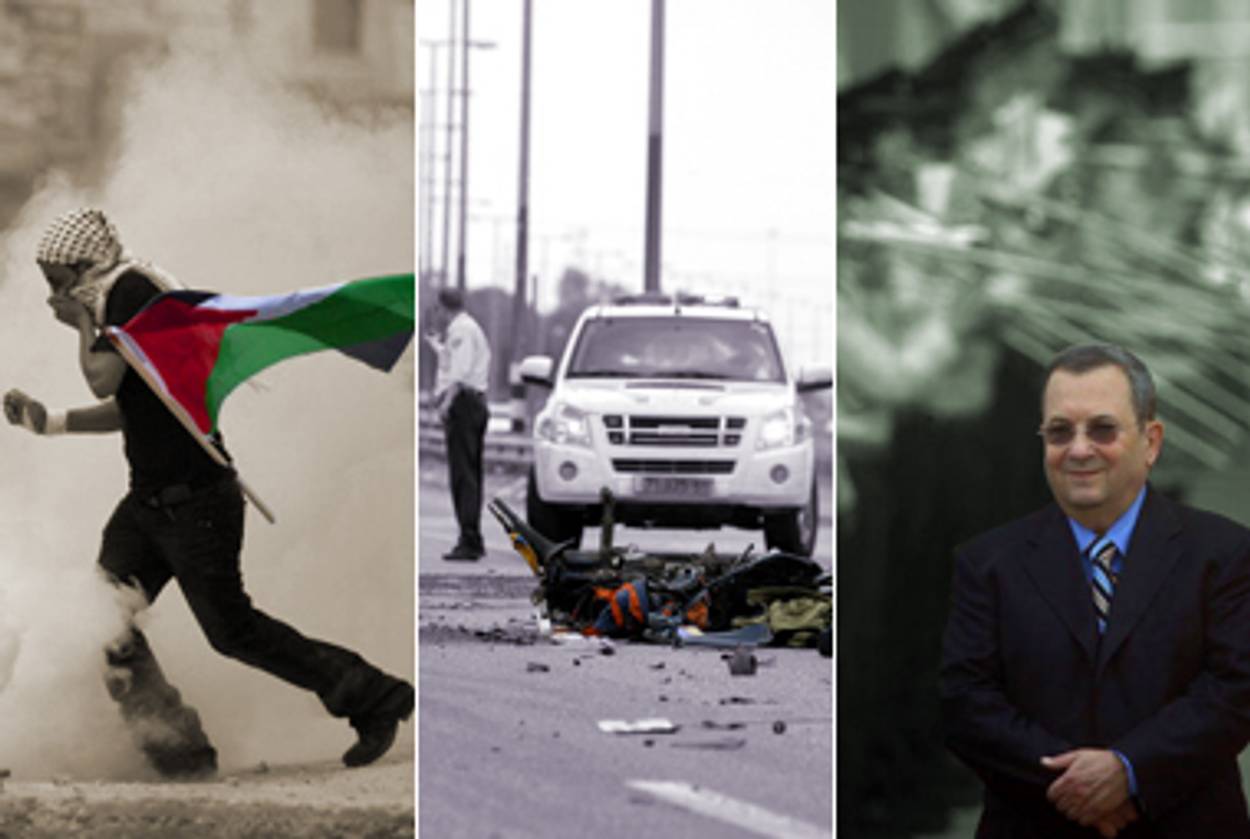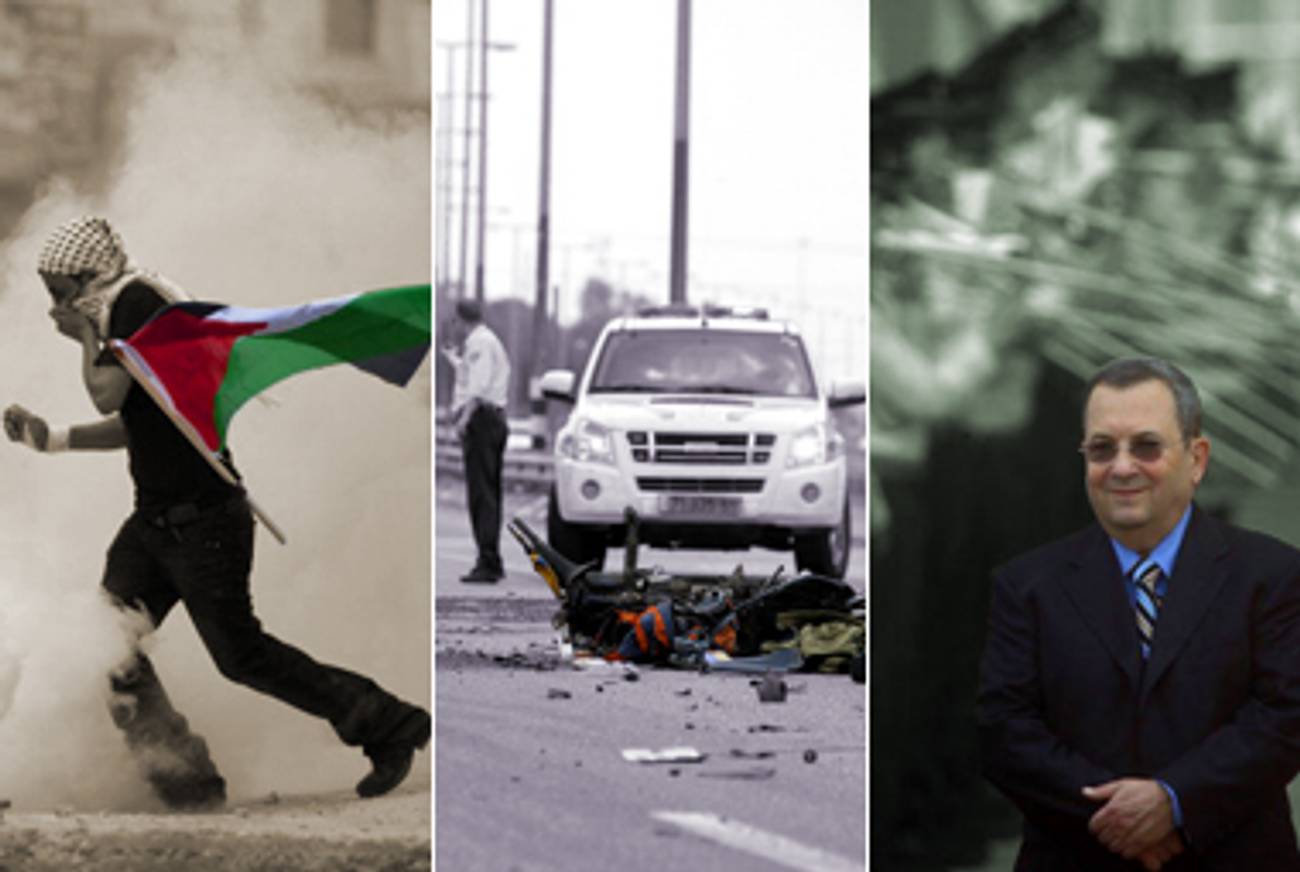Disasters
This week in Israel: borders are breached, a truck runs amok, Netanyahu tests the waters, Barak stands accused, and rabbis fireproof the Sabbath




Breached borders in the north and a truck rampage in Tel Aviv took both security forces and regular Israelis by surprise on Nakba Day this week. Israel’s dailies gave the most prominent coverage to the thousands who attempted to storm Israel’s Lebanese and Syrian borders. Including skirmishes in the West Bank and Gaza, more than a dozen were killed by Israeli and Lebanese military fire. “Ein Gvul,” announced Yedioth Ahronoth, meaning both the literal “No Border” and the figurative “There’s No Limit” (as in, “there’s no limit to what those Arabs will do”). Maariv went with “Al Hagderot” (“On the Fences,” a reference to the fences separating Israel from Syria and Lebanon). One Syrian man managed to get all the way to Jaffa before he turned himself in to Israeli police, and Israel and the United States accused the Syrian government of attempting to use Nakba Day to take the spotlight off its crackdown on pro-democracy protesters. A geography professor at Tel Aviv University objected to the use of the word “border” to describe the incident, since Israel does not have agreed-upon borders with all its neighbors, while one left-wing blogger took aim at those who called the protesters “nonviolent,” writing that regardless of whether the fence-crossers were armed, they were still committing an act of aggression—and deserved to be shot. “Is the fence the real border?” he wrote. “I couldn’t care less. It’s a barrier. A barrier between me and an enemy country.”
Nakba Day began inauspiciously when a truck driver from the Israeli Arab town of Kafr Qasem went on a rampage in Tel Aviv, crashing into multiple vehicles, killing one person and injuring 18. Witnesses said that when he finally drew to a halt, he began assaulting passersby, shouting, “Death to the Jews.” Israel Hayom used a witness’ description of the driver as its headline: “Im Retzah Ba’eynayim” (“With Murder in His Eyes”). Police initially refrained from confirming that the incident was a terror attack, but a police official said later in the week, “The indications are that it was carried out deliberately.” The driver says it was an accident. Wrote one blogger, “Forgive me if I’m a bit skeptical.” The incidents in Tel Aviv and the north overshadowed Nakba Day protests elsewhere. In the West Bank, thousands of Palestinians gathered in Ramallah and protesters clashed with Israeli security forces in Qalandiya; at the Gaza border, Israeli troops opened fire on Palestinians attempting to reach the security fence and killed a Gaza man suspected of planting a roadside bomb in the area.
Prime Minister Benjamin Netanyahu told the Knesset this week that Israel was prepared to “cede parts of our homeland (moledet) for true peace” with the Palestinians, but added that he did not believe that Israel has a Palestinian peace partner. Yedioth characterized the comments as a “promo” (it even used the English word) for Netanyahu’s speech before both houses of Congress next week. “Netanyahu once again crossed the Rubicon, and once again rushed to renounce and quickly clamber back up the bank whence he came,” wrote Ben Caspit in an analysis for Maariv headlined “Tza’ad Leyamin, Tza’ad Lasmol” (“One Step to the Right, One Step to the Left”).
The state comptroller (mevaker hamedina) accused Defense Minister Ehud Barak of violating “the spirit of the rules” (ruah haklalim) meant to prevent conflicts of interest by waiting until three days before he joined former Prime Minister Ehud Olmert’s government, in 2007, before transferring the shares in his international consultancy firm to his daughters. But Haaretz’s Aluf Benn wrote (albeit in a piece that came out before the comptroller’s report was released) that Barak stands a good chance of becoming prime minister again. Responding to the headline on Benn’s story, “Ehud Barak Doesn’t Care If No One Likes Him,” one commenter wrote: “That is good, since no one likes him.”
Israel’s Sephardic and Ashkenazic chief rabbis as well as Shas spiritual leader Rabbi Ovadia Yosef ruled that celebrations of the Lag Ba’Omer holiday, which begins Saturday night, should be postponed a day to keep Israelis from desecrating the Sabbath (hilul Shabbat) by starting the holiday’s traditional bonfires before Shabbat has ended. But other rabbis oppose the move, and many of the celebrants can reasonably be expected not to care. “Are all those kids—especially the ones who don’t give much of a hoot what the chief rabbis say—going to push off the burning a day?” one Jerusalemite wrote. “We’ll be away this weekend. … But I have a feeling that we’ll be smelling a few roasted marshmallows on the way home.”
Shoshana Kordova is an editor and translator at the English edition of Haaretz. She grew up in New Jersey and has been living in Israel since 2001.
Shoshana Kordova is an editor and translator at the English edition of Haaretz. She grew up in New Jersey and has been living in Israel since 2001.